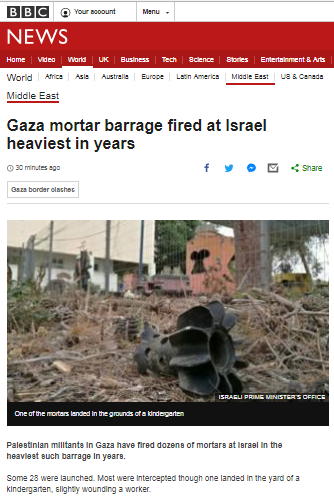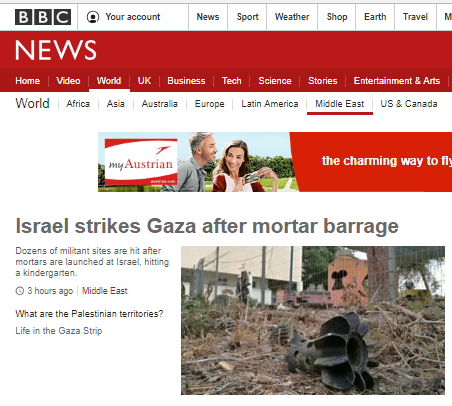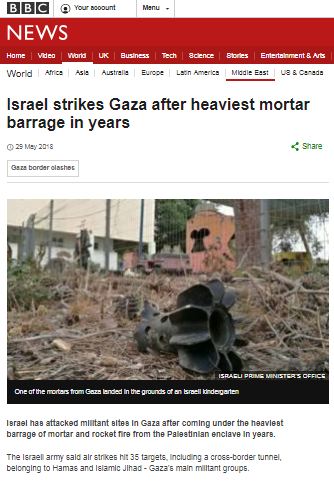Just before 7 a.m. on May 29th residents of Israeli communities near the border with the Gaza Strip had to rush for cover as a barrage of twenty-five mortars was fired by terrorists. Roughly an hour later another two mortars were fired and just after 09:30 a third attack took place.
“At least 28 mortar shells were fired at southern Israel in at least three separate barrages Tuesday morning as sirens blared throughout the area, the army said, amid heightened tensions along the Gaza border.
One person was lightly injured by shrapnel in his shoulder and was being treated at the Soroka medical center in Beersheba. […]
“The army said its Iron Dome missile defense system intercepted the majority of the incoming shells from the first barrage.
One of the shells struck a tree in the yard of a kindergarten in the Eshkol region, less than an hour before students were due to arrive, a spokesperson for the community said. […]
The kindergarten that was hit by a mortar shell — along with all other schools in the area — opened as usual on Tuesday, despite the attack.”
Attacks with both mortars and rockets were renewed in the afternoon hours – including on more distant towns such as Ofakim and Ashkelon – and continued into the evening and night. By 9 p.m. local time at least 70 projectiles (some of which were Iranian-made) had been launched, several Israeli civilians and soldiers had been wounded and Hamas and the second largest armed terror faction in Gaza – the Palestinian Islamic Jihad – had issued a statement claiming joint responsibility for the attacks.

The IDF responded to the attacks throughout the day with strikes on military positions in the Gaza Strip and, separately, destroyed a cross-border tunnel – the tenth in recent months.
So how did the BBC News website cover the day’s events?
Over five hours after the first attack, the BBC News website’s Middle East page published an article that was initially headlined “Gaza mortar barrage fired at Israel heaviest in years” – and tagged “Gaza border clashes”.
At no point in that report were the people who fired military-grade weapons at civilian communities – including an educational establishment for pre-schoolers – described as terrorists.
“Palestinian militants in Gaza have fired dozens of mortars at Israel in the heaviest such barrage in years. […]
Israel responded with air strikes on militant positions in Gaza. There were no immediate reports of casualties. […]
Israeli Prime Minister Benjamin Netanyahu said the Israeli military “will respond very forcefully” to the attacks, which he blamed on Gaza’s ruling Hamas movement and the smaller Gaza-based militant group Islamic Jihad.”

Readers were informed that:
“The Israeli military said a volley of mortar shells were fired at several sites in Israel, with most intercepted by the Iron Dome anti-missile defence system.”
They were not told that the Iron Dome intercepts projectiles that are about to land in populated areas.
In the first five versions of the article, readers found a bizarre description of the purpose of ‘Great Return March’ publicity stunts organised by Hamas and other terror factions to advocate elimination of Israel as the Jewish state and the BBC concealed from audiences the fact that over 80% of those killed between March 30th and May 14th have been shown to have links to assorted terror factions in the Gaza Strip.
“The latest flare-up follows weeks of Israel-Gaza violence which has seen more than 100 Palestinians killed.
They were shot dead by Israeli snipers amid protests which saw thousands of Palestinians mass on the Gaza-Israel border in support of their refugee population.” [emphasis added]
The BBC’s article also mentioned some previous recent incidents that had not been reported by the corporation, including machine gun fire at the town of Sderot on May 28th.
“Hours earlier, machine-gun fire from Gaza hit houses and vehicle in the Israeli border town of Sderot, though without causing injuries, the IDF said.”
It went on to mention an infiltration attempt on May 28th and an IED attack on May 27th.
“The upsurge in violence came after Israeli tank fire killed four militants in Gaza in two separate incidents at the start of the week.
A member of Hamas was killed on Monday after Israeli soldiers caught a group attempting to breach the border and carry out an attack, while on Sunday three members of Islamic Jihad were killed after placing an explosive device on the border fence, the IDF said.”
The first five versions of the article closed with the following description of the events that led up to Operation Protective Edge in 2014:
“The latest cross-border violence is some of the heaviest since a 50-day war between Israel and militants in Gaza in 2014. That followed an upsurge of rocket fire into Israel, and the killing by Israel of the commander of Hamas’s military wing.”

Israel did not kill “the commander of Hamas’s military wing” in July 2014. The BBC appears to have confused that conflict with the previous one in November 2012 when the second-in-command of that organisation – Ahmed Jabari – was killed.
That inaccurate claim was removed some ten hours after the initial attack when the title of the BBC’s rolling report was changed to “Israel strikes Gaza after heaviest mortar barrage in years”. The description of the ‘Great Return March’ was changed but BBC audiences were still not informed that the vast majority of those killed were linked to terrorist organisations.
“More than 100 Palestinians have been killed by Israeli snipers amid protests which saw thousands of Palestinians mass on the border in support of the declared right of Palestinian refugees to return to their ancestral homes in what is now Israel.”
Readers of versions six and seven of the report found the following inaccurate claim: [emphasis added]
Version 6: “The Israeli military said its air force also struck “an offensive Hamas terror tunnel” near the Kerem Shalom crossing, where limited amounts of food, fuel and goods are transferred into Gaza.”
Version 7: “The Israeli military said its air force also struck “an offensive Hamas terror tunnel” near the Kerem Shalom crossing, where controlled amounts of food, fuel and goods are transferred into Gaza.”

Once again the BBC refrained from informing audiences of the purpose of Hamas’ cross-border tunnels in its own words:
“It said the tunnel stretched for 900m (3,000ft) under Israeli territory. It is the latest in a series of cross-border tunnels which Israel has destroyed or disabled since the end of the 2014 Israel-Gaza war.
During that conflict, Israel destroyed more than 30 tunnels which it said were meant for attacks.” [emphasis added]
Readers were told that:
“The Kerem Shalom crossing is a lifeline for Gaza, which has been under an Israeli, then Egyptian, blockade beginning in 2006 when Hamas militants attacked the crossing and kidnapped an Israeli soldier.”
In line with previous editorial policy, BBC audiences were not informed of the fact that serious damage has been done to that “lifeline” on three separate occasions this month by Palestinian rioters directed by Hamas. The BBC’s description of the location of the kidnapping of Gilad Shalit lacks accuracy.
The BBC failed to inform its audiences that Hamas and the Iranian backed PIJ had claimed joint responsibility for the day’s attacks. No mention was made of the fact that equipment and lines supplying power to the southern Gaza Strip were damaged by the terror groups’ missile fire.
Despite the areas under attack being less than a two-hour drive away from the BBC’s Jerusalem bureau, once again the corporation’s audiences did not see any interviews with Israeli civilians affected by the terror attacks.




